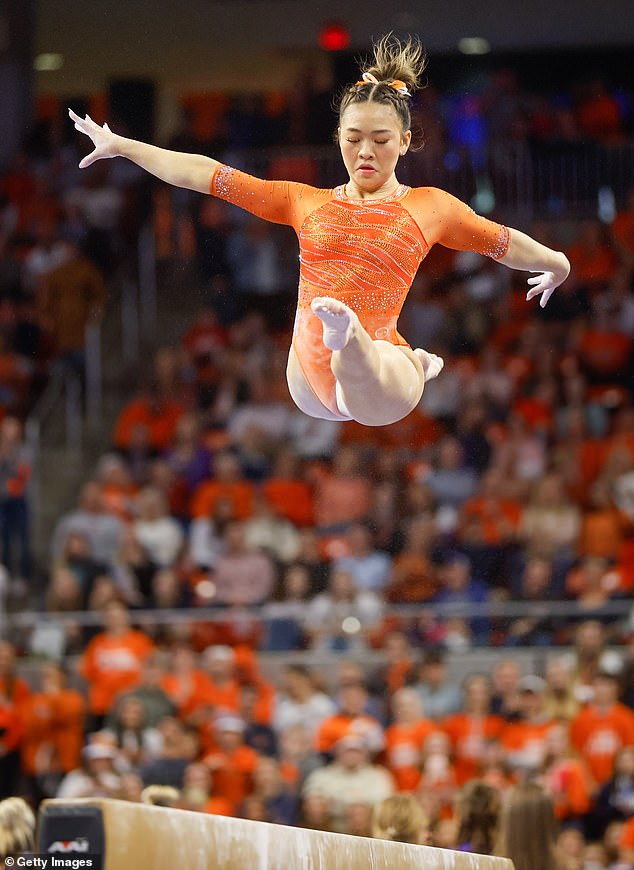Olympic gymnast Suni Lee says she struggled with swelling and gained 40LBS before being diagnosed with an incurable kidney disease
Olympic gymnast Suni Lee has opened up about being diagnosed with an incurable kidney disease, saying she has gained 40 pounds and is still dealing with severe swelling all over her body.
The 20-year-old rose to fame after winning the all-around individual gold medal at the 2020 Olympics. She went on to compete with Auburn University, but her NCAA gymnastics career ended abruptly this year due to her health.
Despite not being able to train consistently over the past six months, she remains focused on securing one of the five spots on Team USA for the 2024 Olympic Games in Paris.
In a new interview with Self magazine, the elite athlete describes the symptoms that led to her life-changing diagnosis and how she feels the pressure to keep up with her former self.
Suni Lee, 20, has opened up about the symptoms that led to her being diagnosed with an incurable kidney disease for the first time

The Self cover star said she gained 40 pounds and was dealing with severe swelling
Lee said her health problems started in February when she woke up with swollen ankles, but she assumed that bags under her eyes were a side effect of her intensive gymnastics training.
The next morning, her entire body was so swollen that it felt as if she had gained several pounds overnight.
The athlete recalled thinking to herself, “This can’t be normal.”
After speaking with her coach, Jess Graba, they reached out Dr. Marcia Faustin, USA Gymnastics team physician.
Lee wanted to see if she could continue training, but she found she was having trouble with the equipment.
“I kept peeling off the bar. I couldn’t keep it up,” she recalled. “My fingers were so swollen, and I couldn’t even do a normal tilt cast to handstand on bars.”
Lee’s doctors initially thought she was having an allergic reaction, but the swelling persisted for weeks.
“I kept getting swollen… and I think I gained about 40 pounds,” she said. “It affected my whole body and how I looked and how I felt.”

Lee rose to fame after winning the all-around individual gold medal at the 2020 Tokyo Olympics (pictured)

Lee went on to compete with Auburn University (pictured in February), but her NCAA gymnastics career ended abruptly earlier this year due to her health.
Lee was unable to participate in an away game against Kentucky in early March because of her symptoms, and she began to worry that her career was over.
‘What if I can never do gymnastics again or never go to the Olympics again?’ she wondered.
After multiple tests and still no diagnosis, Dr. Faustin or Lee’s doctors were there and did a urine test based on her symptoms. She admitted that she had been having trouble urinating for two weeks.
Lee’s urine labs suggested she needed further testing, and she was eventually referred to a specialist who recommended a kidney biopsy to check for signs of damage or disease.
She announced on April 3 that she was prematurely ending her final NCAA season at Auburn due to a “non-gymnastics health issue involving my kidneys.”
Lee disclosed her diagnosis to Self off the record, but she has yet to make it public because her medical team believes it could change with further testing.

Lee said her health problems started in February when she woke up with swollen ankles. The next day her whole body was so swollen that it felt like she had gained a few pounds

“I kept getting swollen… and I think I gained about 40 pounds,” she said. ‘It affected my whole body and how I looked and felt’

The top athlete began to fear that her gymnastics career was over and that she would never make her Olympic comeback
However, she noted that the condition is uncommon and there is no cure. Her doctors are still working on her treatment plan, including medication to control her symptoms.
Lee said she is grateful to finally have answers about her health, but she admitted she had a hard time coping with the diagnosis.
‘How can I just wake up swollen one day and now I’m stuck with this condition for the rest of my life?’ she said.
The gymnast’s health problems have also cast doubt on whether she will be able to make her Olympic comeback.
“I watch myself in videos all the time, and it makes me emotional because I’m just not the same athlete I was before,” she explained.

Lee disclosed her diagnosis to Self off the record, but she has yet to make it public because her medical team believes it could change with further testing.

Lee has adjusted her training and schedule as she learns to manage the unpredictable swelling and side effects of her medication

“I watch myself in videos all the time, and it makes me emotional because I’m just not the same athlete I was before,” she said, but she remains focused on training for the 2024 Olympics in Paris
Despite her fears, Lee made a triumphant return at the US Gymnastics Championships last month, winning a bronze medal on the balance beam.
‘We didn’t think I would be here. We didn’t know what was possible. We didn’t know what was going on with me – and here I am on the big stage, competing,” she said.
Lee told the magazine that she is still learning to adjust to the unpredictable swelling, which occurs almost every day, and the side effects of her medications.
After years of competitive gymnastics, she has had to develop other habits to manage her health, including eating more often, watching her salt intake and resting more.
The athlete has also prioritized her mental health. She moved back to Minnesota, saw a therapist twice a week and got an Australian Shepherd puppy she named Bean.
Most of all, she has learned to listen to her body, which led her to pass up the opportunity to compete at the World Artistic Gymnastics Championships in Belgium this week.
However, Lee has made it clear that she is not ready to give up on her Olympic dreams.
“I know gymnastics isn’t my whole life, and it won’t be my whole life,” she said, “but right now it’s my life.”
